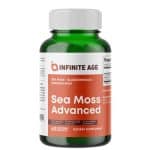Celtic sea salt has gained immense popularity recently due to its numerous health benefits and unique mineral composition. This comprehensive article explores its importance in the diet, the recommended daily intake, and the factors to consider when determining your personal salt needs.
Quick Summary
You should consume about 1/4 to 1/2 teaspoon of Celtic sea salt per day, depending on your individual needs and health status.
What is Celtic Sea Salt?
Celtic sea salt, also known as Sel Gris or “gray salt,” is a type of unrefined, minimally processed sea salt harvested from the pristine waters of the Celtic Sea off the coast of Brittany, France.
Unlike traditional table salt, which is heavily processed and stripped of natural minerals, Celtic sea salt retains its rich array of essential minerals and trace elements, including potassium, magnesium, calcium, and iron.
Importance of Celtic Sea Salt in the Diet
Salt is a crucial mineral in the human body, vitally involved in maintaining fluid balance, regulating blood pressure, supporting nerve function, and aiding in absorbing essential nutrients.
While the importance of salt in the diet is well-established, it’s crucial to balance consuming the right amount and avoiding excessive intake, which can lead to various health issues.
Recommended Daily Celtic Sea Salt Intake
The recommended daily salt intake varies depending on age, gender, and overall health status. According to the American Heart Association, the recommended daily limit for sodium (the main component of salt) is no more than 2,300 milligrams (mg) per day for healthy adults.
However, for individuals with certain medical conditions, such as high blood pressure or heart disease, the recommended limit may be lower, around 1,500 mg per day.
Understanding the Different Types of Salt
It’s important to note that not all salts are created equal. Several types of salt are available on the market, each with unique characteristics and nutritional profiles.
In addition to Celtic sea salt, other types of salt include:
- Table salt: Highly processed, stripped of minerals, and often contains added iodine and anti-caking agents.
- Himalayan pink salt: Minimally processed, contains trace minerals, and is often touted for health benefits.
- Sea salt: Unrefined, contains some natural minerals, but the mineral content can vary depending on the source.
Benefits
Celtic sea salt stands out from other types of salt due to its exceptional mineral content and unique flavor profile. Some of the key benefits of incorporating Celtic sea salt into your diet include:
Mineral-rich
Celtic sea salt contains many essential minerals, including potassium, magnesium, calcium, and iron, crucial for overall health and well-being.
Supports Electrolyte Balance
The natural balance of minerals in Celtic sea salt helps maintain proper fluid and electrolyte levels, which are essential for optimal bodily function.
Enhances Flavor
Celtic sea salt has a delicate, slightly salty flavor that can enhance the taste of various dishes, making it a versatile seasoning option.
Supports Immune Function
The trace minerals found in Celtic sea salt may help support a healthy immune system, potentially reducing the risk of certain illnesses.
Promotes Healthy Skin
Some studies suggest that the mineral content in Celtic sea salt may benefit skin health, potentially improving conditions like acne and eczema.
Factors to Consider When Determining Celtic Sea Salt Intake
When it comes to determining the optimal amount of Celtic sea salt to consume per day, there are several factors to consider:
- Age and Gender: The recommended daily salt intake varies based on age and gender. Generally, adults should aim for no more than 2,300 mg of sodium per day, while children and adolescents may have slightly lower requirements.
- Overall Health Status: Individuals with certain medical conditions, such as high blood pressure, heart disease, or kidney problems, may need to limit their salt intake to 1,500 mg or less daily.
- Physical Activity Level: People who are physically active or live in hot climates may require a slightly higher salt intake to replenish the electrolytes lost through sweat.
- Dietary Preferences and Restrictions: Individuals following specific dietary plans, such as a low-sodium or ketogenic diet, may need to adjust their salt intake accordingly.
How Much Celtic Sea Salt Should You Consume per Day?
Given the unique characteristics of Celtic sea salt and the various factors that influence individual salt needs, it’s difficult to provide a one-size-fits-all recommendation. However, as a general guideline, most healthy adults can safely consume up to 1/2 to 1 teaspoon (2,300 to 4,600 mg of sodium) of Celtic sea salt daily, depending on their overall health status and activity level.
It’s important to note that this is a general recommendation. You should always consult your healthcare provider to determine the optimal amount of salt for your specific needs.
Some individuals may require a higher or lower intake based on their unique circumstances.
Tips for Incorporating Celtic Sea Salt into Your Daily Diet
Here are some practical tips to help you incorporate Celtic sea salt into your daily routine:
- Use it in Cooking: To enhance the flavor of your meals, sprinkle a pinch of Celtic sea salt into soups, stews, roasted vegetables, and meat dishes.
- Add it to Baked Goods: Incorporate a small amount of Celtic sea salt into your baking, such as bread, muffins, or cookies, to balance the sweetness and add depth of flavor.
- Swap it for Table Salt: Replace your regular table salt with Celtic sea salt in your everyday cooking and seasoning.
- Try a Celtic Sea Salt Soak: Add a handful of Celtic sea salt to your bathwater for a relaxing and detoxifying soak.
- Use it as a Finishing Salt: Sprinkle a small amount of Celtic sea salt on your dishes before serving to add flavor and texture.
Potential Risks of Consuming Too Much Celtic Sea Salt
While the health benefits of Celtic sea salt are well-documented, it’s important to remember that excessive salt consumption can lead to adverse health effects, such as:
High Blood Pressure
Consuming too much salt can contribute to the development of high blood pressure, which increases the risk of heart disease and stroke.
Fluid Retention
Excessive salt intake can cause the body to retain fluid, leading to swelling, bloating, and discomfort.
Kidney Problems
The kidneys regulate the body’s salt and water balance, and consuming too much salt can strain these vital organs.
Osteoporosis
Some studies suggest that a high-salt diet may increase the risk of osteoporosis by promoting calcium excretion from the body.
Conclusion
Celtic sea salt is a unique and highly beneficial addition to any diet. It offers a wealth of essential minerals and a delightful flavor profile.
By understanding the recommended daily intake, the factors that influence your individual salt needs, and the proper ways to incorporate Celtic sea salt into your meals, you can optimize your health and enjoy the many benefits this remarkable salt offers.
I encourage you to consult a qualified healthcare professional or a registered dietitian to learn more about the optimal amount of Celtic sea salt for your specific needs and explore the best ways to incorporate it into your daily routine.
They can provide personalized guidance and help you develop a salt intake plan that aligns with your overall health and wellness goals.



